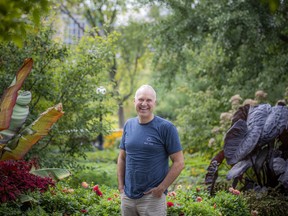Health
National Capital Commission Aims to Transform Ottawa’s Waterfront

The National Capital Commission (NCC) is striving to reshape its image and the urban landscape of Ottawa with a series of innovative projects aimed at enhancing public access to the city’s waterfront. Following the recent inauguration of the Dow’s Lake dock, which took place on a brisk June day, the NCC is actively promoting Ottawa as a destination for urban swimming. This initiative reflects a broader ambition to rejuvenate the capital’s relationship with its waterways.
The Dow’s Lake dock, which has drawn both admiration and skepticism, is part of a growing trend toward urban swimming in Ottawa. While some residents initially questioned the safety of swimming in the lake, tests reveal that its water quality is among the cleanest in the city. The dock, designed to be unsupervised, represents a shift in mindset, challenging traditional views about safety and regulation in the National Capital Region.
Tobi Nussbaum, the NCC’s CEO, has been a driving force behind this transformation. He emphasizes the need for the NCC to adopt a more agile and creative approach. “The idea that we could create a floating dock that people could swim from puts us on the same scale as what Paris has done with the Seine,” Nussbaum stated. This comparison highlights the NCC’s ambition to elevate Ottawa’s status in urban design and recreational offerings.
Innovative Projects Reshape the Waterfront
The NCC’s commitment to enhancing Ottawa’s waterfront is evident in several major projects, including the $20 million renovation of the River House, which opened in 2023 and attracted over 36,000 visitors shortly after its debut. Another prominent development is Westboro Beach, a $21 million initiative that involved a partnership between the NCC and the city. Both projects have received enthusiastic responses from the public, demonstrating a strong community interest in urban swimming.
In addition to these significant undertakings, the NCC is also working on the redesign of Kiweki Point, previously known as Nepean Point, which will serve as a scenic lookout rich in Indigenous and settler history. This project connects Major’s Hill Park to the waterfront through an elevated walkway, further integrating the city with its natural surroundings.
The NCC is also exploring smaller, yet impactful projects, such as the introduction of floating saunas along the Ottawa River, with plans for the first sauna to open by the end of 2023. This initiative reflects the NCC’s commitment to experimentation and responsiveness, as they seek to create vibrant public spaces.
A Shift Towards Community Engagement
The NCC’s evolving approach is part of a larger cultural shift within the organization. In recent years, it has prioritized public engagement, holding open meetings and encouraging community feedback. Nussbaum points out that the NCC is unique among Crown corporations in that its meetings are open to the public, fostering transparency and collaboration.
Critics of the NCC have historically expressed concerns about its bureaucratic nature and decision-making processes. Issues such as the controversial proposal to close parts of Queen Elizabeth Drive for pedestrian use have sparked public debate. Nonetheless, the NCC is working to address these concerns and align its vision with local needs, recognizing that public support is crucial for the success of its initiatives.
As cities around the world, including Copenhagen and Zurich, embrace urban swimming, Nussbaum sees Ottawa’s growing interest as a natural evolution. He believes the city’s climate and accessibility to water create an opportunity for innovative recreational spaces. “The Dow’s Lake dock was an opportunity to pilot a different model of swimming, which is unsupervised—a faster, lighter, less expensive way to introduce swimming in different parts of the capital,” he explained.
As the NCC continues to develop its waterfront projects, Nussbaum encourages a culture of risk-taking and creativity among staff. By supporting innovative ideas and being open to experimentation, the NCC aims to create a dynamic public space that resonates with residents and visitors alike.
The push for revitalization has not gone unnoticed, with local leaders and urban planners recognizing the NCC’s efforts to make Ottawa a more inviting and engaging capital. As projects like the Dow’s Lake dock gain popularity, the NCC is poised to redefine the city’s relationship with its waterways and establish Ottawa as a leader in urban design and recreational opportunities.
In the face of historical criticism, the NCC is making strides toward a more inclusive and vibrant future for Ottawa, inviting residents to engage with their city and enjoy its natural beauty.
-

 Science3 months ago
Science3 months agoToyoake City Proposes Daily Two-Hour Smartphone Use Limit
-

 Top Stories3 months ago
Top Stories3 months agoPedestrian Fatally Injured in Esquimalt Collision on August 14
-

 Health3 months ago
Health3 months agoB.C. Review Reveals Urgent Need for Rare-Disease Drug Reforms
-

 Technology3 months ago
Technology3 months agoDark Adventure Game “Bye Sweet Carole” Set for October Release
-

 World3 months ago
World3 months agoJimmy Lai’s Defense Challenges Charges Under National Security Law
-

 Lifestyle3 months ago
Lifestyle3 months agoVictoria’s Pop-Up Shop Shines Light on B.C.’s Wolf Cull
-

 Technology3 months ago
Technology3 months agoKonami Revives Iconic Metal Gear Solid Delta Ahead of Release
-

 Technology3 months ago
Technology3 months agoApple Expands Self-Service Repair Program to Canada
-

 Technology3 months ago
Technology3 months agoSnapmaker U1 Color 3D Printer Redefines Speed and Sustainability
-

 Technology3 months ago
Technology3 months agoAION Folding Knife: Redefining EDC Design with Premium Materials
-

 Technology3 months ago
Technology3 months agoSolve Today’s Wordle Challenge: Hints and Answer for August 19
-

 Business3 months ago
Business3 months agoGordon Murray Automotive Unveils S1 LM and Le Mans GTR at Monterey









